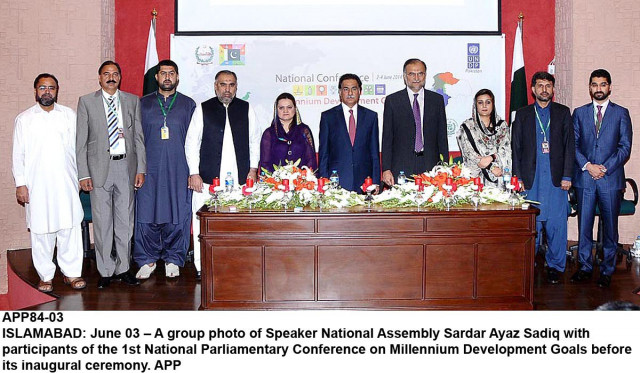National Conference on MDGs: Govt allocates Rs12.5 billion to help accelerate progress
Legislators draw up plans to meet targets.

To map out a strategy to meet MDGs, legislators were split into working groups, each tasked with developing parliamentary work plans to accelerate progress on an MDG. PHOTO: APP
Prioritising social development initiatives, Rs12.5 billion has been earmarked in the 2014-15 budget for community-led initiatives to achieve Millennium Development Goals (MDGs).
Minister for Planning, Development and Reform Ahsan Iqbal said this on the second day of the “National Parliamentary Conference on Millennium Development Goals” at the Pakistan Institute for Parliamentary Services on Tuesday.
To map out a strategy to meet MDGs, legislators were split into working groups, each tasked with developing parliamentary work plans to accelerate progress on an MDG.
National Assembly Speaker Sardar Ayaz Sadiq suggested provincial lawmakers constitute committees in their respective legislatures to oversee provincial governments’ progress on MDGs.
According to a report on MDGs, the first of which is about eradicating poverty, the persistent downward trend in poverty over the past decade is reflected by the decline in the poverty line which fell from 34.5% in 2001- 2002 to 12.4% in 2010-2011.
Pakistan’s unemployment to population ratio increased from 27.1% in 2001-2002 to 30.9% in 2010-2011, making the prospect of full employment by 2015 highly unlikely.
Malnutrition measured as prevalence of underweight children less than five years of age has decreased from 40% in 1990-1991 to 31.5% in 2011-2012 but is still far off the MDG target of less than 20%. With two out of the three targets off-track, the country is unlikely to achieve MDG1.
Former speaker of the National Assembly Dr Fehmida Mirza said, “No development scheme can be successful without taking women on board.
Dr Aliya Khan from Quaid-i-Azam University observed that “There is a need to develop human capital to deal with inequality. Although representation of women has increased in legislatures globally, Pakistan is 135th out of 136 nations according to the 2013 Gender Gap Report. Women comprise only 22 per cent of the workforce.”
In a separate session on MDG2 on education, Seema Aziz from Care Foundation stated, “Education is the biggest equaliser and change can be immediate.” Pakistan’s target of 100% primary school enrolment, 100% completion of education from grade 1 to 5 and an 88% literacy rate are unlikely to be met.
Rates of net primary enrolment and completion increased up to the mid-2000s. In 2011-2012, it decreased from 57% to 50%. The literacy rate is 58% overall, but it is highly skewed towards males at 70% as compared to 47% for females. Pakistan is off-track on all three targets.
Special MDG Task Force Chairperson MNA Marriyum Aurangzeb stated that a time-bound and goal driven work plan would be drawn up and revised annually.
The conference was called in response to UNDP research indicating that Pakistan adopted 16 targets with 41 indicators, of the 34 indicators for which data is available, 24 are off track and unlikely to be met by 2015. The legislators will work to determine a way forward.
The conference will continue tomorrow with more working group sessions on individual MDGs.
Published in The Express Tribune, June 4th, 2014.


















COMMENTS
Comments are moderated and generally will be posted if they are on-topic and not abusive.
For more information, please see our Comments FAQ